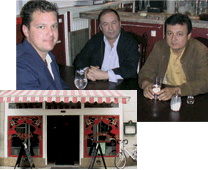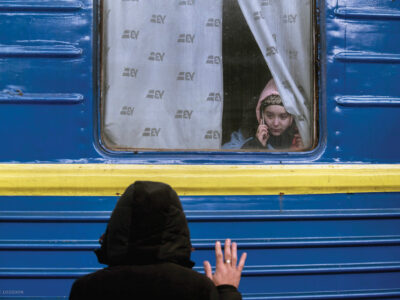By Tristan Mabry
I may have just had lunch with a couple of terrorists. We met at a restaurant not far from the central train station in Munich, nominally Indian though far from a typical curry-house: A television played music videos of dancing girls with long braids, who twirled in circles accompanied by mustachioed men sporting skull caps. Subtitles of lyrics written in an Arabic script streamed across the screen and the waiters bore more resemblance to someone from Istanbul than Calcutta.

In fact, the restaurant is owned and run by Uyghurs, a Muslim people related in most every way to Turks who settled along the ancient Silk Road in what is now the western edge of the People’s Republic of China. They had their own state, the Republic of East Turkestan, in the 1940s, but troublesome neighbors—Mao and Stalin—squeezed it out of existence. Conflict has simmered ever since as waves of ethnic Chinese migrants come to an area they call Xinjiang. Literally this translates as “new frontier,” though of course the territory was hardly new to people there who had been resident since about the ninth century.
Their situation is far from unique. Muslim ethnic minorities agitating for autonomy or outright independence are abundant—the most famous being the secession of Bengalis to form Bangladesh from East Pakistan in 1971. More recent cases include Bosnia, Kosovo, and eastern Macedonia; current examples include Azeris, Abkhazi, Berbers, Chechens, Kashmiris, Kurds, Malays, Moros, Sindhis, and others.
Their various independence movements have all clashed violently with the regimes that control their claimed homeland. But if all these cases include Muslim populations, we may ask whether the fight has more to do with faith or flag? Should we classify them as religious conflicts, ethnic conflicts, neither or both? Though in some cases Islamists are undoubtedly active, are they a cause of the conflict or an effect of long-term instability?
To answer this question I am interviewing the leadership of organizations pursuing self-determination for a particular Muslim people in a particular place. My meeting in Munich was with Dolqun Isa and Abduljelil Qarkash, both top officials of the Munich-based World Uyghur Congress (WUC) and, according to Beijing, active terrorists in league with Islamic fundamentalists. But the charter of the WUC is secular and eschews any mention of Islam. What’s going on here?
The next day in Frankfurt I put this question to Erkin Alptekin, the president of the WUC and the son of East Turkestan republic founder Isa Yusuf Alptekin. “Disinformation and propaganda,” retorted Alptekin. “Uyghurs have always been religious moderates: We want a republic, never a theocracy.”
A week earlier, in Stockholm, I met with the exiled leaders of the Aceh Sumatra National Liberation Front (in the original tongue the acronym is GAM). Representing about four million Acehnese, a Muslim people culturally and linguistically distinct from Indonesia’s dominant Javanese, GAM claims the right to national self-determination, rejecting Jakarta as an imperialist invader. The Indonesian government has also argued that GAM is an Islamist organization seeking the rule of Islamic law, or sharia.
In August, in Helsinki, GAM signed a peace deal with the Indonesian government; this “Memorandum of Understanding” may have ended 29 years of fighting by allowing the Acehnese to elect a regional parliament to run all affairs in Aceh, while Jakarta retains control of economic and strategic relations with other countries. GAM also agreed to a secular administration in concord with Indonesia’s secular constitution. I asked the GAM leader who signed the Helsinki document, Malik Mahmud, why they agreed to this provision. His answer: “We want to protect our culture, our language, our history: The Acehnese people don’t want sharia, they just want to be free.”
Because a secular pair may be exceptions to a religious rule of Muslim minority conflict, I am also traveling and talking directly to Kurds in northern Iraq, Sindhis in Karachi, Muslims in Kashmir, Acehnese in Sumatra, and Moros in Mindanao at the southern tip of the Philippines.
There are, of course, easier ways of researching international political science, but to find out why people are fighting for independence, it is always helpful to actually ask them.
Tristan Mabry is a former economics reporter for The Wall Street Journal and producer for CNN who is currently a Ph.D. candidate in political science. This is the first in a series of reports for the Gazette on his travels to meet with the leaders of Muslim independence groups as part of his research for his dissertation, “Nationalism and the Politics of Language in Muslim Minority Conflict.”




